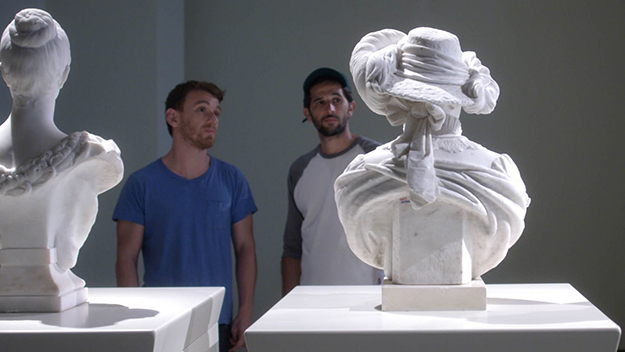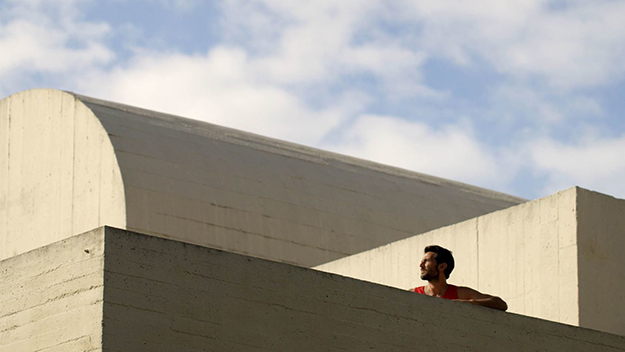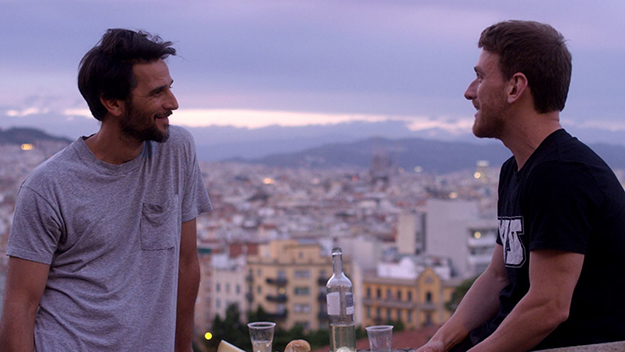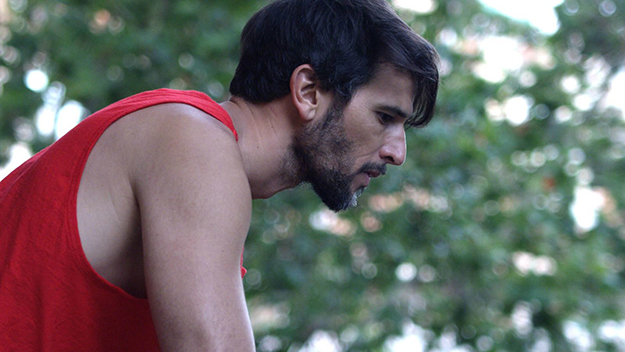Queer & Now & Then: 2019
In this biweekly column, Michael Koresky looks back through a century of cinema for traces of queerness, whether in plain sight or under the surface. Read the introductory essay.

Images from End of the Century (Lucio Castro, 2019)
Even the most casual follower of movies becomes a student of time. Basic filmic elements like flashbacks or flash-forwards, long takes or quick cuts, achronological storytelling or “real-time” longueurs have all made time just part of the basic language, reminding viewers of its centrality as a property in this very strange art form that only looks like it lives and breathes.
If the ability to represent time in all its elasticity and fungibility has long been one of the central hallmarks of modern and postmodern cinemas, queer time adds a wrinkle. One of the ideas underlying much of queer theory is that history as we’ve long known it is ruled by heteronormative values and properties; in terms of time, this creates an essential linearity, a constantly regenerating process whose fuel is, in essence, procreation. Unmoored from this stability, queer people function differently within the folds of time and thus queer art reflects this, existing in those in-between time-spaces. In her book Time Binds: Queer Temporalities, Queer Histories, theorist Elizabeth Freeman writes of artworks that “prevaricate, inventing possibilities for moving through time, encountering pasts, speculating futures, and interpenetrating the two in ways that counter the common sense of the present tense.”
Freeman was centering on such disparate examples as Virginia Woolf’s novel Orlando, avant-garde filmic works by Isaac Julien, and nonnarrative videos by Cecilia Dougherty and Elisabeth Subrin, yet such theories could also be used to apply to narrative cinema by essential queer filmmakers like Terence Davies, Jean Cocteau, and Alain Guiraudie, who both isolate and expand time, coasting on waves of memory and fantasy. End of the Century, the remarkable debut feature by Argentinean director Lucio Castro, is in this way the queerest mainstream film I’ve seen in years, a temporally unexpected work in which possible pasts and potential futures intermingle to create an unstable now. It’s a radiantly noncommittal love story, in which time folds in on itself not as a formal exercise but as an intensely felt expression of its characters’ shifting desires as well as their persistent fears. They are fears that, I would argue, are specific to the queer experience, theoretically and otherwise—namely that time is passing us by.
Fitting for a film about transitory spaces, a significant part of it takes place in a sparsely furnished apartment that we gradually come to understand is an Airbnb. This is where Ocho (Juan Barberini) hangs his hat while traveling alone in Barcelona. In the wordless first passage, this handsome wanderer, who appears to be somewhere in his early forties, silently traverses the city, sits alone at cafés, explores the topiaries of Laberint d’Horta Park; back at the quiet apartment he plucks Jules Verne’s Around the Moon from a small pile of dog-eared paperbacks, searches a fridge stocked only with a six-pack and some leftover cheese, and peruses Grindr before giving up and masturbating in bed. His days seem solitary but not lonely, pointing towards a tale of potential discovery rather than ennui and urban alienation.

We see him lounging at the beach the next afternoon reading the Verne novel, but he’s not immersed enough to miss what we in the audience have already seen: an attractive, also solitary, bathing-suited man (Ramon Pujol) in the background going for dip in the sea. Ocho follows him into the water but keeps a distance; even when they’re visible as just two heads bobbing in the waves, it’s clear the men are playing a game of flirtation. The other man, pretending not to notice him, heads back to the beach; when Ocho emerges, a beautiful sight to behold himself, the gaze has for the first time shifted to the point of view of the other man, who summarily takes off. No connection has seemingly been made; still there has been no dialogue in the film.
Later, in the first and least far-fetched of the film’s many intentional coincidences, Ocho notices someone familiar passing by his Airbnb balcony. In the film’s first line, he yells down to the man from the beach: “Kiss!” It’s a hopeful enticement but more directly a reference to the KISS T-shirt worn by the stranger, named Javi, who agrees to come on up. After the initial hesitant awkwardness of two unacquainted people who know they’re about to have sex, Ocho and Javi fall into bed, but not before Ocho—who has insisted he’s on PrEP—must procure a condom from the corner pharmacy at Javi’s demand. In two intimate shots—the first discreetly angled from behind with Ocho’s back to the camera as he puts on his condom—we see that the men are versatile in their sexual positions, a detail of no small importance, I would venture, in a film that becomes so much about infinite possibility. Their bodies fully explored, they segue into post-coital pillow talk, though interest seems overall dim. It’s only after they exchange pleasant goodbyes and Javi leaves that it occurs to Ocho that he could do with some company.
After reconnecting via text, the two men relate the apparent details of their lives over a winding, single-take conversation on a picturesque Barcelona rooftop, open bottle of wine perched precariously between them. We first really learn about them at the same time they do, though the specifics make them only somewhat less inchoate. Ocho is a poet from Madrid living in New York, and he just broke up with his boyfriend of 20 years before his trip. Javi lives in Berlin, is originally from Barcelona, and is the producer of children’s TV show called Old Dog; he’s in an open but committed marriage; and he and his husband have a very young daughter. Both men seem conspicuously youthful—not to mention physically perfect—for quite so much life experience, but no matter, bodies turns out to be as malleable as memory in Castro’s increasingly unexpected vision. Finally, Ocho, after talking to Javi for what must be hours, after fucking Javi and being fucked by Javi, out of the blue, claims to have a “weird sensation we’ve met before.” This is followed by an immediate sharp cut, and we’re suddenly in a different time, though it takes us more than a moment to realize this and adjust to a new reality.

Ocho is again on the move through the city, his travel bags again indicating the itinerancy that seems to define him, and he’s again staying in an apartment that’s not his, though this time it belongs to his friend, Sonia (Mia Maestro). As the two of them sit at her kitchen table, Ocho talks of a prior girlfriend, Esther, while Sonia discusses her difficult recent breakup with her boyfriend Eli, who has since gone to California to teach yoga. Her new lover will be back soon, she says, though he hasn’t made an appearance. As we try to adjust to these new characters and reference points, we also may try to situate ourselves in time. But temporal signifiers are all over the map. As we are invited to extreme close-ups of Ocho taking photos around the city, we might note the abundance of gray in his beard; we might notice that underneath a postcard he’s writing to Eli, he still clutches that weather-beaten Jules Verne paperback—both tossed-off details that lead us to assume the film has jumped forward in time. Yet there are no cell phones; there is no Grindr. And Ocho seems younger, more naïve and anxious: after a timid bout of cruising in the park, leading to a cursory blowjob from a buff stranger, he lurches back to Sonia’s apartment, vomits, and looks at a conspicuously rudimentary web page with information about AIDS and oral sex. Coming down with a sudden illness, Ocho is nursed back to health by Sonia’s boyfriend, who just happens to be Javi.
The two men meet all over again, even though we know that in the world of the film they have met before, or, rather, that they will meet again. Are these literal versions of Ocho and Javi, or fictional representations of an idea of them? More details emerge: ocho was our traveler’s first spoken word as a toddler, hence his nickname (real name: Gustavo); he tells Javi he has just decided to leave the business world and become a writer. Javi, on the other hand, is a filmmaker (the career aspirations of a young man who ends up working on a German children’s show called Old Dog, perhaps?); currently he’s planning on making a film about Y2K panic, an amusing side note that firmly situates us in the late ’90s.
Ocho and Javi wander; our minds wander. We might wonder: if this is 20 years earlier, could this be the beginning of Ocho’s two-decade relationship, which he tells the contemporary version of Javi has just ended? How many versions of Ocho and Javi could there be? With Sonia out of town, Ocho and Javi dance vigorously in the apartment to Flock of Seagulls. They fall all over each other. They make love again for the first time.

In the film’s final, enormously poignant third passage, we return to the contemporary moment. But then Castro quietly shuttles us into an alternate version of the present, or perhaps it’s the not-too-distant future. In a Kubrickian transition that feels like a warmly domestic echo of the climactic collapsing of space and time from 2001, Ocho discovers—or does he imagine?—that his Airbnb has become a home: a child’s squeaky toy obstructs his path, the once sparse bachelor’s fridge is suddenly full. Javi’s infant daughter—which he has revealed was achieved through an egg donation from Sonia—resides in the Airbnb apartment with the men, who are now committed, Baby Björn–toting dads (their lack, however, of dad bods might be another clue to the temporal impossibility of this sudden seeming reality). In less than 90 minutes, the scope of a possible relationship has played out, though it remains unverified, a love always just on the verge, two lives like particles floating in the ether.
Ocho, whose name conjures multiples in itself, seems a repository for a succession of anxieties specific to gay men of the late 20th and early 21st centuries: fear of AIDS, fear of commitment, and, increasingly prevalent, the fear of parenthood. All three of these fears signal, to wildly different degrees, the potential eradication of queerness. Is it better to cohabitate, to procreate, than to remain a wanderer, a nomad? At one point during the film’s ’90s passage, a quote from artist and AIDS activist David Wojnarowicz’s memoir Close to the Knives appears on screen, scrolling left to right: “If I could find a way to remain forever in transition, I could remain in a state of perpetual freedom.” Ocho and Javi are indeed forever in transitory spaces, though it’s up to us to decide what freedom means to them, to us, to gay people today. Queer history moves fast, but queer time, as lovingly expressed in End of the Century, is still in-between, a truth and a prevarication, a maybe and a never-was.
Michael Koresky is a writer, editor, and filmmaker in Brooklyn. He is cofounder and editor of the online film magazine Reverse Shot, a publication of Museum of the Moving Image; a regular contributor to the Criterion Collection and Film Comment, where he writes the biweekly column Queer and Now and Then; and the author of Terence Davies, published by University of Illinois Press, 2014.







